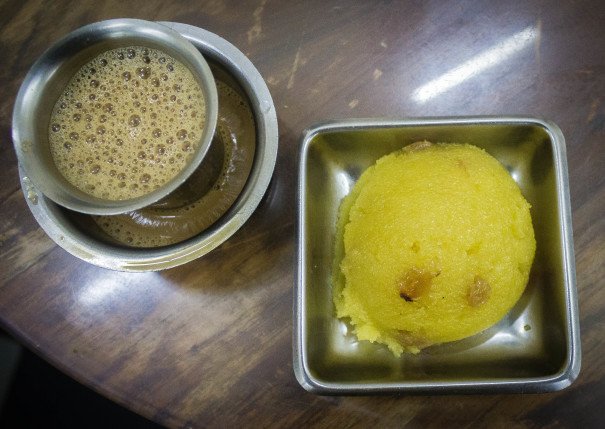
To Remain Loyal, Embrace Change

To Remain Loyal, Embrace Change
Sheera in Mumbai
It’s early in the morning, way too early for me to be up. But here I am, walking down the street, in desperate need of breakfast. On my right is a temple where the morning pooja is in full swing, the sounds of a hundred cymbals clanging away in harmony. Outside the temple, hawkers urge me to buy garlands of flowers for the idol. I politely decline and walk faster, eager to get to my destination before the whole neighborhood descends on it.
I’m headed to Ram Ashraya, a blink-and-you’ll-miss-it Udupi restaurant in a Mumbai suburb called Matunga, which has long been home to a large community of South Indians, thus earning itself the name “mini Madras.” When you’re in Matunga, you’re transported away from the hurried, brash Mumbai, and into a world that could very well be author RK Narayan’s fictional South Indian town of Malgudi, albeit with a dash of cosmopolitan flavor.
For over 70 years, Ram Ashraya’s kitchen has been churning out crisp, buttery dosas and fluffy idlis doused in sambhar for its loyal patrons.
I remember the first time I visited Ram Ashraya. It was four years ago, when I was a newbie in this big bad city called Mumbai, and when eating out on weekends still meant frequenting inexpensive joints that wouldn’t burn a hole in my pocket. The fragrance of strong filter coffee hung in the air, enticing all those walking past. It clearly worked, because standing with me was a swarm of people determined to get a table inside. I persevered, and a half hour later I was seated. Thus began a love affair with a breakfast treat.
I don’t visit as often as I used to, but when I do, even the hour-long wait on weekends can’t deter me.
This time, I’m in luck: the restaurant isn’t as crowded as usual, so I pull up a chair at a tiny two-seater table. Ram Ashraya is a no-frills eatery. You enter, eat, pay, leave. They don’t have the time to brandish fancy menus or give you more attention than necessary. Instead, the waiter rattles off the names of dishes available on that day, the name of each dish merging with the next, giving you something that sounds like “IdliSambharMysoreMasalaDosaMysoreSadaMeduVada.”
If you’re familiar with the routine, you understand Waiterspeak. And if you’re anything like me, you don’t much care for it. You already know what you’re here for: the sheera.
This breakfast offering is also referred to as kesari bhath (saffron rice) in northern Karnataka, which is where Ram Ashraya’s version was perfected. The dish is essentially sweetened, ghee-laden semolina studded with raisins and cashew nuts. But the cooks at Ram Ashraya take this Udupi menu staple to another level. Walk in before 10 am, and you’ll be served the former kind. However, arrive when the clock strikes 10: 01 am and you’re introduced to a whole new world of flavored sheera, from the not-too-uncommon pineapple to the outlandish mango, strawberry, and butterscotch. What’s even more surprising, however, is the ease with which the people residing in the locality have adapted to, nay, embraced this innovation, including the orthodox South Indians who would rather give up their Carnatic music than veer from tradition.
With this thought in my mind, I devour the contents of the two plates before me, one a banana sheera and the other, guava, the flavors of the day. As I’m walking out, I realize why everyone keeps coming back: because change, after all, is the only constant.